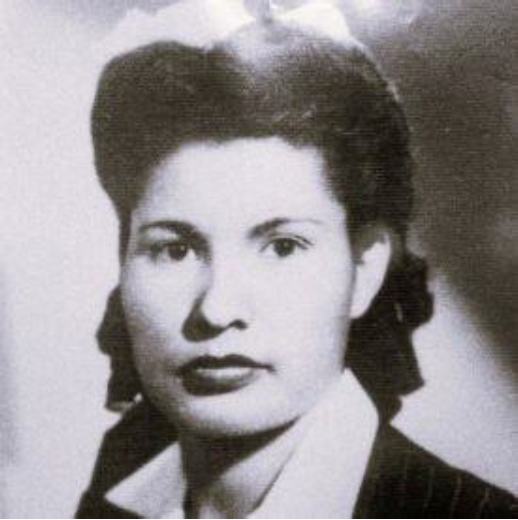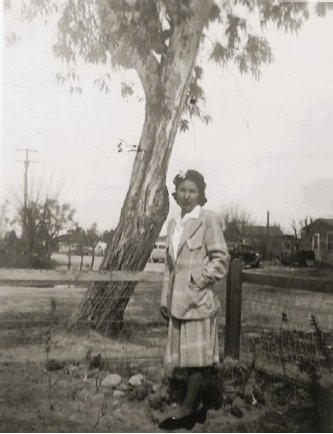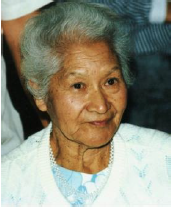
A child of “The Greatest Generation,” Esperanza Moreno Arredondo was born on August 21, 1919 in Los Angeles, California, to Leonor Ramos Moreno and Zacarias Moreno.
On the world stage, with the recent signing of the Treaty of Versailles on June 28, 1919, World War I was officially ended. The Great Influenza epidemic, the so-called “Spanish Flu” resulting in millions of deaths world-wide, struck in 1918-1920. The Great Depression of 1929-1939 caused seismic economic hardships throughout the USA as well as internationally.
Not unlike many Mexican-American families who found themselves facing economic hardships even prior to the Great Depression, beginning in 1928 at the age of 9 years, Esperanza Moreno traveled with her family from Los Angeles, California to begin the arduous life of a migrant farmworker, in the Central San Joaquin Valley and throughout California. Toiling long hours under the scorching sun, faced with unregulated working conditions, living in a tent, and moving from one location to the next to follow the harvest was the life Esperanza lived as a child. In 1936 at the age of 17 years, Esperanza and her family settled in Kerman, California, purchasing property on the southwest corner of 8th and ‘B’ Streets.
On September 1, 1939, World War II erupted in Europe with Nazi Germany’s invasion of Poland. Despite the US effort to remain a distant and neutral observer, the Japanese surprise attack on Pearl Harbor on December 7, 1941 brought American into the war. While millions of patriotic young men volunteered for the armed forces, the defense department’s need for military equipment and supplies resulted in an increased demand for labor on the “home front.” Several million women of all backgrounds filled the labor shortages doing unconventional work in manufacturing plants and shipyards throughout the US. They worked long hours as welders, operating rivet guns, and more, to do their part in patriotically supporting “the war effort”.
In 1938, at the age of 19 years, Esperanza Moreno had wedded Antonio Rocha and relocated to his hometown of Brawley, California, and gave birth to her first child, a son, Feliz Moreno Rocha. In 1943, now a divorcee, Esperanza and Feliz returned to her family in Kerman. Esperanza’s aunt from Los Angeles, Lupe Ramos Melendez, visited and informed her niece of the newly created job opportunities for women at the factory where she worked, the Douglas Aircraft Company in El Segundo, California.

As a single parent who needed to support herself and her young child, Esperanza accompanied her aunt to Los Angeles and secured a job as an assembly line worker at Douglas on the night shift (3pm-midnight) and began her training as a Gun Trough Riveter for the B-24 Liberator bomber aircraft. Having successfully completed the mandatory two-week training program, Esperanza was now a full-time Gun Trough Riveter at Douglas Aircraft! Through her own grit, resilience, and sense of patriotic duty, namely those indelible cultural traits aligned with the generational members of “The Greatest Generation,” Esperanza had succeeded in joining the ranks of America’s esteemed “Rosie the Riveters!”
Ironically, possessing a limited 8th grade education, aside from her assigned duties, Esperanza was handed the additional task of training high school students in the skills required of a Gun Trough Riveter. These trainees reported for their two-week training sessions after school, from 3pm-10pm. And as Esperanza did during her own training, these high schoolers faced the same outcome of either being retained for employment or dismissed at the conclusion of the designated training period.
Esperanza had been steadily employed at Douglas Aircraft for six months, when she received word that her mother in Kerman had fallen ill. On temporary “leave” from Douglas, she dutifully returned to Kerman to provide her ailing mother with in-home care. Although her employer had approved a maximum “leave” of 3 months, Esperanza was unable to meet that set deadline for her return and her employment at Douglas Aircraft was terminated.
As a member of the Greatest Generation, Esperanza was not easily deterred. Displaying her resilience, she went to her local Employment Development Office and was referred to the Lockheed Aircraft Company in Fresno, California. As part of the vast war production effort, the Defense Department sought large sites across the country which could be quickly transformed into operating subassembly plants. Fresno, California had been selected as it provided existing industrial infrastructure that could be quickly converted into essential preassembly plants. Additionally, these sites were chosen as it was deemed that a sizable, untapped labor force exist within and around Fresno to meet the labor demand.
Valuing her work experience at Douglas, Lockheed quickly hired Esperanza as a riveter. This new job served not only as a much needed steady paycheck, but it served as her honorable reenlistment into the iconic “Rosie the Riveter” army of women workers who proudly served their country by “doing men’s work” when their nation needed them most! The country’s appreciation of the Rosies was reflected, and forever immortalized, in 1943 by the Four Vagabonds’ popular hit song, “Rosie the Riveter.”
Initially tasked with riveting aircraft panels, Esperanza was later assigned to prepare the dimpling on both the upper and lower dorsal fins of the P-38 Lightening Fighter aircraft. In a testament to her exemplary work ethic and her eagerness to expand her job skills, Esperanza was selected on multiple occasions to undergo additional training, including specialized assignments, at the Lockheed facilities located in Hollywood, Glendale, and Burbank, California.
On the war front, after several major battles were waged across Europe and in the Pacific, the Allied Forces achieved victory in 1945, and World War II ended, beginning the process of repatriation of military personnel and American manufacturers’ return to the production of peacetime products and goods. With military discharge and re-entry into civilian life, returning soldiers would be seeking their re-entry into the job market, and would need those shipyard, factory and manufacturing jobs that had been filled by women during the war. Consequently, with this increasing infusion of male workers back into the labor force, Esperanza’s time as a “Rosie the Riveter” came to an end.
Esperanza returned to the only employment options available to her, toiling the long hours as a farm worker and also seeking employment as a domestic worker in order to meet the basic necessities for herself and her now 7 year old son.
Meantime, one of those returning soldiers, Pete Chavira Arredondo, a resident of Kerman and a World War II combat veteran of the Army 76th Infantry Division, 304th Infantry Regiment, having fought in three major battles in 1945 in the European Theater of Operations, including the Battle of Ardennes/Battle of the Bulge, the Battle of Rhineland and lastly the Battle of Central Europe, was eventually repatriated to the USA on August 21, 1945. Upon receiving his Honorable Discharge from the Army on May 14, 1946, he began his journey back home to his parents’ 20-acre Rancho located on the outskirts of Kerman at the intersections of California Avenue and Siskiyou Avenue. His first stop in his long journey back home would find him detouring from his expected route to reunite with his migrant farm worker family in the prune orchards of Morgan Hill, California.
On April 13, 1947, Esperanza “Hope” Moreno entered into marriage with Pete Chavira Arredondo. Shortly following their marriage, Esperanza and Pete Arredondo purchased a small 3-room house which sat on a double-wide lot on the eastside fringes of the Kerman city limits at the corners of South 9th and West ‘B’ Streets. Although the existing dwelling was a very spartan unit, the surrounding yard provided ample space to accommodate a large, freestanding chicken coop, a sizable rabbitry which housed well over one hundred rabbits, as well as ample space for an abundance of a variety of fruit trees and vegetable gardens. In the very near future there would be even more mouths to feed and on a limited budget. These homegrown goods would prove to be an important source of sustenance for the family for years to come, particularly during the cold and rainy winter months.
From this 23-year union, Esperanza would give birth to eight children: one daughter and seven sons (Pete Jr, Estella, Martin, Thomas, George, Robert, Michael and Richard Arredondo). Eventually, a more suitable house was purchased by Esperanza and Pete and relocated onto the same property. Being deeply committed to her young children, Esperanza remained a steadfast homemaker until family circumstances allowed her to seek employment outside of the home. Although her spouse consistently maintained gainful employment, rarely missing a day’s work, Esperanza eventually chose to resume her employment as a domestic worker, working part-time to supplement the family’s income. Her clientele included some longtime Kerman Floyd Elementary School instructors as well as some old-time Kermanites who were well-established Italian-American farmers.

Esperanza happily retired at the age of 65 years and was honored with a surprise celebration held at the Kerman Portuguese Hall, attended by many of her long-time friends and many relatives, including her beloved Auntie “Lulu” Lupe Melendez from Los Angeles, who had enlistedf her into the ranks of the “Rosie the Riveter” so long ago, back in 1943.
In her retirement, Esperanza remained a resident of Kerman, residing throughout the years on the same plot of land for nearly the remainder of her life. Stricken with the dementia of Alzheimer’s, and following a brief hospitalization in December of 2009, Esperanza went to live in Fresno with her son, Pete Arredondo, Jr., who retired early to better care for his beloved mom. Pete Jr. made certain that his mother was provided with all of the loving care and personal assistance which she now required. For the following 3 years, with her son as her primary caregiver, out-of-home placement was never a consideration for Esperanza despite the advancement of dementia. Esperanza continued up until her final day to exhibit delight in the company of her family, especially when she was surrounded by her loving grandchildren and great-grandchildren. Esperanza Moreno Arredondo passed away peacefully in her son’s home on December 30, 2012 at the age of 93, surrounded by her family.
Read more amazing, heartwarming, and heroic Rosie Stories in the American Rosie the Riveter Association’s exclusive Rosie Stories books. (Click here to purchase.)
